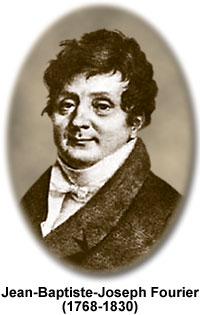Jean-Baptiste-Joseph Fourier
(1768-1830)

Jean-Baptiste-Joseph Fourier was a mathematician and Egyptologist, most famous for his studies on heat and for the infinite mathematical series he introduced to aid in solving conduction equations. The Fourier series has since transcended its originally intended purpose, spawning many new areas of study in mathematics and physics, including the branch of optics named for him.
Born on May 21, 1768, Fourier was the ninth of twelve children of a French tailor and his second wife. By the time he was ten years old, both of Fourier's parents had died. He was an excellent student, however, showing early promise in mathematics. Yet, he decided to train for the priesthood and began study with the Benedictines in 1787. He never took his vows, but assumed a position teaching mathematics at the Benedictine College where he had studied.
By 1793, Fourier had found another interest, becoming involved in politics and the French Revolution. He was imprisoned for a time and almost went to the guillotine, but Robespierre was beheaded first, which led to many political changes and Fourier's eventual release. He then studied in Paris and later accepted a teaching position at the Polytechnic School in the same city. In 1798, Fourier accompanied Napoleon and his troops to Egypt as a scientific adviser and for the next several years he studied Egyptian antiquities in addition to his more militaristic duties. When he returned to France he compiled the materials and held various administrative posts under Napoleon who made him a Baron in 1809.
While acting as Prefect and living in Grenoble, Fourier completed most of his important mathematical work involving the theory of heat. In 1807, he had finished his work On the Propagation of Heat in Solid Bodies and presented it to the Paris Institute on December 21. Received with doubt and controversy, there was no early attempt to publish the essay. However, after accepting another administrative post bestowed upon him by Napoleon and then returning to Paris after his defeat in 1815, Fourier resumed his research. He was elected to the French Academy of Sciences in 1817, became Secretary of the organization in 1822, and published his award winning essay Analytical Theory of Heat that same year. The final years of his life he continued his studies and published numerous other papers, eventually dying on May 16, 1830.
